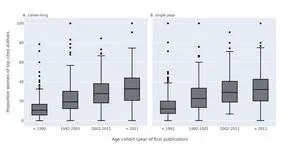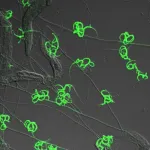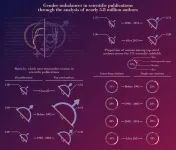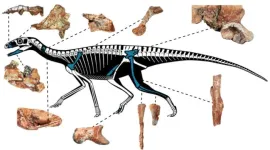(Press-News.org) (MEMPHIS, Tenn. – November 21, 2023) Findings from St. Jude Children’s Research Hospital are moving the field of cancer immunotherapy one step closer to treating brain and solid tumors. Scientists at St. Jude validated a cellular immunotherapy target called 78-kDa glucose-regulated protein (GRP78) in proof-of-principle experiments. The group also discovered a resistance mechanism whereby some tumors trick the cancer-killing immune cells into expressing GRP78, thereby turning off the immune cells or causing them to be killed, too. The research, which has implications for developing immunotherapy for the broad range of difficult-to-treat brain and solid tumors expressing GRP78, was published today in Cell Reports Medicine.
Reprogramming a patient’s immune cells to target cancer has been successful against leukemia but not brain or solid tumors. These reprogrammed cells, called chimeric antigen receptor (CAR) T cells, target a specific protein expressed on cancer cells but not healthy ones. This targeting enables CAR T–cell immunotherapy to kill the tumor while leaving healthy tissues unharmed selectively. One difficulty that has stymied the success of CAR T cells in brain and solid tumors is the challenge of identifying a good target for these cancers.
“We found GRP78 is a great CAR T–cell target,” said senior co-corresponding author Giedre Krenciute, Ph.D., St. Jude Department of Bone Marrow Transplantation and Cellular Therapy. “We saw high GRP78 expression in a multitude of brain and solid tumor types, including adult glioblastoma, diffuse intrinsic pontine glioma (DIPG), osteosarcoma, triple-negative breast cancer and Ewing sarcoma, but our therapeutic efficacy was variable.”
The researchers created GRP78-targeted CAR T cells that successfully killed many types of cancers in both cell and mouse models, though with significant variation. The researchers expected that higher levels of GRP78 (more protein to target) would make it easier for the CAR T cells to locate and destroy the cancer; however, that was not the case. The scientists found no relationship between the amount of GRP78 and the ability of the CAR T cells to kill cancer.
“We showed the conventional approach of targeting expression doesn’t mean an equal response,” said co-corresponding author Paulina Velasquez, M.D., St. Jude Department of Bone Marrow Transplantation and Cellular Therapy. “GRP78 seems to be a special target that did not react as we expected, making it a promising but complicated candidate.”
Tumors trick CAR T cells
“We expected two different tumors with the exact same level of antigen [GRP78] expression to be affected by the CAR T–cell therapy in the same way, but they aren’t,” said first author Jorge Ibanez, Ph.D., St. Jude Department of Bone Marrow Transplantation and Cellular Therapy. “Instead, we found certain tumor cell types were altering T-cell activation and T-cell GRP78 expression.”
Ibanez found that resistant tumor cell types were altering the CAR T cells. The tumor cells caused the GRP78-targeted CAR T cells to express GRP78 on the CAR T cells’ surface. The more GRP78 on the T cells, the less active they became, reducing their cancer-killing activity. In addition, CAR T cells that remained active targeted and killed their counterparts expressing GRP78 on their surface.
In effect, the resistant tumors were conning the CAR T cells. These tumors raised the flag of GRP78, saying, “I’m here,” and then convinced the approaching T cells to raise their own GRP78 flag. This tricked the CAR T cells into killing each other or giving up, leaving the tumor relatively unscathed.
Through these experiments, the St. Jude group unveiled the tricky biology of GRP78. The protein remains a tantalizing target, given its presence on many difficult-to-treat tumor types. Findings show scientists will need to expand their understanding of this newfound interaction with T cells to make viable GRP78-targeted immunotherapies. Still, if they can, these CAR T cells may be broadly applicable across a broad range of tumor cell types.
“We always need to find new targets to improve cancer treatment,” Krenciute said. “What we found from a biological perspective is that GRP78 has potential but is different from previous cancer-associated molecules. We showed that as scientists develop the next generation of CAR T–cell therapies, we need to recognize that not all targets are equal.”
Authors and funding
The study’s other authors are Nikhil Hebbar, Unmesha Thanekar, Zhongzhen Yi, Haley Houke, Meghan Ward, Chris Nevitt, Liqing Tian, Stephen Mack, Heather Sheppard and Jason Chiang, all of St. Jude.
The study was supported by grants from the National Institutes of Health (NIH) (P01CA096832 and R50CA211481), National Cancer Institute (P30CA021765), ChadTough Defeat DIPG Foundation (R01NS122859), American Brain Tumor Association (ABTA) Basic Research Fellowship supported by Humor to Fight the Tumor and ALSAC, the fundraising and awareness organization of St. Jude.
St. Jude Media Relations Contacts
Michael Sheffield
Desk: (901) 595-0221
Cell: (901) 379-6072
michael.sheffield@stjude.org
media@stjude.org
Rae Lyn Rushing
Cell: (901) 686-2597
raelyn.rushing@stjude.org
media@stjude.org
St. Jude Children’s Research Hospital
St. Jude Children’s Research Hospital is leading the way the world understands, treats and cures childhood cancer, sickle cell disease and other life-threatening disorders. It is the only National Cancer Institute-designated Comprehensive Cancer Center devoted solely to children. Treatments developed at St. Jude have helped push the overall childhood cancer survival rate from 20% to 80% since the hospital opened more than 60 years ago. St. Jude shares the breakthroughs it makes to help doctors and researchers at local hospitals and cancer centers around the world improve the quality of treatment and care for even more children. To learn more, visit stjude.org, read St. Jude Progress blog, and follow St. Jude on social media at @stjuderesearch.
END
Promising target for CAR T cells helps cancer trick the immune system
Scientists at St. Jude Children’s Research Hospital showed that GRP78 is a promising but complex target for CAR T–cell immunotherapy for brain and solid tumors.
2023-11-21
ELSE PRESS RELEASES FROM THIS DATE:
Researchers help unravel brain processes involved in vision
2023-11-21
TORONTO, Nov. 21, 2023 – Faced with images that break the expected pattern, like a do not enter sign where a stop sign is expected, how does the brain react and learn compared to being shown images which match what was predicted?
That was the question a team, including York University, set out to answer. A long-standing theory suggests the brain learns a predictive model of the world and its internal predictions are updated when incoming sensory data proves them wrong. However, what the researchers found surprised them, says York Faculty of Science Associate Professor Joel Zylberberg, co-corresponding author of the newly published paper.
“Testing ...
Unearthing how a carnivorous fungus traps and digests worms
2023-11-21
A new analysis sheds light on the molecular processes involved when a carnivorous species of fungus known as Arthrobotrys oligospora senses, traps and consumes a worm. Hung-Che Lin of Academia Sinica in Taipei, Taiwan, and colleagues present these findings November 21st in the open access journal PLOS Biology.
A. oligospora usually derives its nutrients from decaying organic matter, but starvation and the presence of nearby worms can prompt it to form traps to capture and consume worms. A. oligospora is just one of many species of fungi that can trap and eat very small animals. Prior research has illuminated some of the biology behind this ...
Taxing sugar-sweetened beverages in Germany would improve population health and save money
2023-11-21
In Germany, taxing sugar-sweetened beverages could prevent or postpone cases of type 2 diabetes, extend healthy lifespans and save up to €16.0 billion in societal costs over the next 20 years, according to a new study led by Karl Emmert-Fees of the Technical University of Munich, published November 21st in the open access journal PLOS Medicine.
The World Health Organization has recommended that governments worldwide lessen the social and economic burden of cardiometabolic disease by taxing sugar-sweetened beverages. These taxes either reduce consumption by increasing the price, such as the one peso per liter ...
Germany: Sugar tax could save as much as 16 billion euros
2023-11-21
A simulation study conducted by a team from the Technical University of Munich (TUM) demonstrates that a soft drink tax in Germany would have significant positive effects. In all of the simulated variants evaluated, less sugar was consumed and the rate of illness dropped. This would be a way to reduce costs to the national economy and alleviate the burden on the health care system. There is, however, a difference between taxes aimed at reducing soft drink consumption and taxes aimed at bringing about changes in product formulation.
Sugary beverages increase the risk of obesity and illnesses such as diabetes. Several countries have therefore introduced taxes on soft drinks. In Germany ...
Most-cited scientists: still mostly men, but the gender gap is closing
2023-11-21
An analysis of 5.8 million authors across all scientific disciplines shows that the gender gap is closing, but there is still a long distance to go. The new research by John Ioannidis of the Meta-Research Innovation Center at Stanford (METRICs) at Stanford University, US, and colleagues, publishes November 21st in the open access journal PLOS Biology.
There is a strong gender gap in science which manifests itself in many ways. One of the most prominent ones is the relative representation of men and women among the scientists whose work receive the most attention in the ...
New fossil assemblage highlights complexity of classifying silesaurid phylogeny
2023-11-21
A set of fossils recovered in Rio Grande do Sul, Brazil’s southernmost state, has brought an extra layer of complexity to the study of the evolutionary history of silesaurids, a family of dinosauriforms (dinosaurs and their close relatives) that lived in the Triassic period between 247 million and 208 million years ago.
In an article published in the Journal of Vertebrate Paleontology, researchers affiliated with institutions in Brazil and the United States show that even with the new fossil assemblage ...
CRF launches Scientific Excellence Top 10 (SET-10)
2023-11-21
NEW YORK – November 20, 2023 – The Cardiovascular Research Foundation (CRF), in conjunction with the Transcatheter Cardiovascular Therapeutics (TCT) 2023 conference, CRF's annual scientific symposium, announced today the launch of the CRF Scientific Excellence Top 10 (SET-10), a new global annual ranking recognizing academic contributions to interventional cardiovascular medicine.
The SET-10 initiative, aligning with CRF's commitment to advancing the field, aims to recognize and celebrate the extraordinary contributions made by medical and academic ...
Cleveland Clinic research finds sex differences in immune response and metabolism drive Alzheimer’s disease
2023-11-21
Tuesday, Nov. 21, 2023, CLEVELAND: Cleveland Clinic researchers analyzed genes and brain tissue of patients with Alzheimer’s and found that differences in brain immunometabolism – the interactions between the immune system and the ways cells create energy – may contribute to women’s increased risk for the disease and its severity.
The findings, published in Alzheimer’s and Dementia, offer important insight into developing sex-specific treatment and prevention options for Alzheimer’s disease, the sixth-leading ...
Hearing loss is associated with subtle changes in the brain
2023-11-21
Hearing loss affects more than 60 percent of adults aged 70 and older in the United States and is known to be related to an increased risk of dementia. The reason for this association is not fully understood.
To better understand the connection, a team of University of California San Diego and Kaiser Permanente Washington Health Research Institute researchers employed hearing tests and magnetic resonance imaging (MRI) to determine whether hearing impairment is associated with differences in specific brain regions.
In the November 21, 2023 issue of the Journal of Alzheimer’s Disease, researchers reported that individuals enrolled in this observational ...
Long in the Bluetooth: Sussex scientists develop a more efficient way to transmit data between our devices
2023-11-21
University of Sussex researchers have developed a more energy-efficient alternative to transmit data that could potentially replace Bluetooth in mobile phones and other tech devices. With more and more of us owning smart phones and wearable tech, researchers at the University of Sussex have found a more efficient way of connecting our devices and improving battery life. Applied to wearable devices, it could even see us unlocking doors by touch or exchanging phone numbers by shaking hands.
Professor Robert Prance and Professor Daniel ...
LAST 30 PRESS RELEASES:
Differing immune responses in infants may explain increased severity of RSV over SARS-CoV-2
The invisible hand of climate change: How extreme heat dictates who is born
Surprising culprit leads to chronic rejection of transplanted lungs, hearts
Study explains how ketogenic diets prevent seizures
New approach to qualifying nuclear reactor components rolling out this year
U.S. medical care is improving, but cost and health differ depending on disease
AI challenges lithography and provides solutions
Can AI make society less selfish?
UC Irvine researchers expose critical security vulnerability in autonomous drones
Changes in smoking status and their associations with risk of Parkinson’s, death
In football players with repeated head impacts, inflammation related to brain changes
Being an early bird, getting more physical activity linked to lower risk of ALS
The Lancet: Single daily pill shows promise as replacement for complex, multi-tablet HIV treatment regimens
Single daily pill shows promise as replacement for complex, multi-tablet HIV treatment regimens
Black Americans face increasingly higher risk of gun homicide death than White Americans
Flagging claims about cancer treatment on social media as potentially false might help reduce spreading of misinformation, per online experiment with 1,051 US adults
Yawns in healthy fetuses might indicate mild distress
Conservation agriculture, including no-dig, crop-rotation and mulching methods, reduces water runoff and soil loss and boosts crop yield by as much as 122%, in Ethiopian trial
Tropical flowers are blooming weeks later than they used to through climate change
Risk of whale entanglement in fishing gear tied to size of cool-water habitat
Climate change could fragment habitat for monarch butterflies, disrupting mass migration
Neurosurgeons are really good at removing brain tumors, and they’re about to get even better
Almost 1-in-3 American adolescents has diabetes or prediabetes, with waist-to-height ratio the strongest independent predictor of prediabetes/diabetes, reveals survey of 1,998 adolescents (10-19 years
Researchers sharpen understanding of how the body responds to energy demands from exercise
New “lock-and-key” chemistry
Benzodiazepine use declines across the U.S., led by reductions in older adults
How recycled sewage could make the moon or Mars suitable for growing crops
Don’t Panic: ‘Humanity’s Last Exam’ has begun
A robust new telecom qubit in silicon
Vertebrate paleontology has a numbers problem. Computer vision can help
[Press-News.org] Promising target for CAR T cells helps cancer trick the immune systemScientists at St. Jude Children’s Research Hospital showed that GRP78 is a promising but complex target for CAR T–cell immunotherapy for brain and solid tumors.







